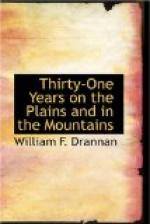The following day we pulled for the trapping region, by way of the old San Jose mission, and from there to the old mission of San Gabriel, thence across the Mojave desert. From there we struck out for the mouth of the Gila river, and crossed just where it empties into the Colorado. We then traveled up what is known as Salt river, some distance from where we crossed the Gila. This was early in January, and we found plenty of beaver that were easy to catch.
No trapping had been done in that region for several years. Besides, we thought at the time, and it so proved, that we were entirely out of the way of hostile Indians.
Here we put in two months trapping, with splendid success. Then, as it was getting too late in the season to trap, Jim proposed that we take our little stock of goods, or a portion of it, and visit the Pima tribe of Indians, which we found to be not as great a distance away as we had supposed, it being only about forty miles to their village.
They all knew us and were glad to see us. The chief and some other of the head men were out on their annual hunt, and we did not get to see them, as we only stayed two days, during which time they treated us the very best they knew how. They had plenty of vegetables such as turnips, onions, potatoes, sweet potatoes, etc.
While on this visit a certain young Indian got to be a great friend to me, but I am sorry to say that I have forgotten his name. He had a sister whose name was Nawasa, who also got to be a warm friend of mine, and I must say, that, although an Indian, she was a lady in her way, and I thought, really, that she was the best looking Indian I had ever seen.
The evening that we were to start back to our camp, Nawasa came to me and told me in Spanish that her brother wanted to see me, and that he had something to tell me. I started off with her, and after we had gone a short distance I asked her where her brother was, and she pointed to a bunch of bushes, saying he was there.
On my arrival at the spot I asked him what he wished to say to me. I knew he had something private and important to say, otherwise he would not have called me to an out-of-the-way place like that.
He raised to his feet and looked around to see if there was any one in sight, and said in Spanish:, “Sit down here, me and my sister have something to tell you.”
He started in by saying that the Apaches were very bad Indians, and that they had killed many of my friends; which showed that he considered all white people my friends.
“Six or seven years ago,” he continued, “they killed a man, his wife, and two boys, and took two girls prisoners. A long time ago the smallest girl died and the big girl buried her.”
At this, Nawasa spoke and said: “Many times I have gone with her to the village and heard her sing a pretty song, but I could not understand a word of it.”
I asked if this girl was living yet.




